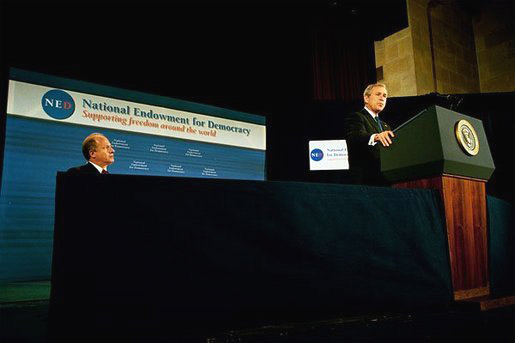
WASHINGTON (BP)–President Bush challenged Middle Eastern nations in a Nov. 6 address to take greater steps toward democracy for the benefit of people everywhere who deserve to be free.
“Instead of dwelling on past wrongs and blaming others, governments in the Middle East need to confront real problems and serve the true interests of their nations,” Bush said at the U.S. Chamber of Commerce in recognition of the 20th anniversary of the National Endowment for Democracy.
“The good and capable people of the Middle East all deserve responsible leadership,” the president said. “For too long, many people in that region have been victims and subjects. They deserve to be active citizens.”
Bush cited such victories for democracy as those in Germany and Japan, noting that most people believed such a government would never succeed in those countries. He also said observers often question whether a certain nation is ready for democracy, but “it is the practice of democracy that makes a nation ready for democracy, and every nation can start on this path.”
Bush said he believes every person has the ability and the right to be free, and as Arab scholars report, the “freedom deficit [in the Middle East] undermines human development and is one of the most painful manifestations of lagging political development.”
Some Middle Eastern governments have been led by dictators who have promised a return to ancient glories, Bush said, but instead have left a legacy of torture, oppression, misery and ruin.
Others have gained influence through an ideology of theocratic terror, he said.
“Behind their language of religion is the ambition for absolute political power,” Bush said of ruling cabals like the Taliban.
“Many Middle Eastern governments now understand that military dictatorship and theocratic rule are a straight, smooth highway to nowhere,” the president continued. “But some governments still cling to the old habits of central control. There are governments that still fear and repress independent thought and creativity and private enterprise — the human qualities that make for strong and successful societies.”
Bush then called on specific governments to take specific steps toward awarding all citizens the freedom that is rightly theirs.
“The regime in Teheran must heed the democratic demands of the Iranian people or lose its last claim to legitimacy,” he said.
The path of democracy is the only path to progress for the Palestinian people, Bush continued, and the Palestinian leaders who undermine democratic reform are “not leaders at all.”
Saudi Arabia’s government is taking the first steps toward reform, the president acknowledged, by initiating a plan for the gradual introduction of elections.
“By giving the Saudi people a greater role in their own society, the Saudi government can demonstrate true leadership in the region,” he said.
Next the president commended Egypt but also had a challenge for the government there.
“The great and proud nation of Egypt has shown the way toward peace in the Middle East and now should show the way toward democracy in the Middle East,” Bush said.
For those critics who will say Americans are only attempting to make every other nation like themselves, Bush said, “… we are mindful that modernization is not the same as Westernization.” He said democratic nations could be constitutional monarchies, federal republics or parliamentary systems. Working democracies also take time to develop, he said, noting the United States’ 200-year journey toward inclusion and justice.
As the most recent example of democracy taking shape in a nation, Bush cited Afghanistan and the success of President Karzai in leading Afghans to build a modern and peaceful nation.
“Next month, 500 delegates will convene a national assembly in Kabul to approve a new Afghan constitution,” Bush noted. “The proposed draft would establish a bicameral parliament, set national elections next year and recognize Afghanistan’s Muslim identity while protecting the rights of all citizens. Afghanistan faces continuing economic and security challenges, and it will face those challenges as a free and stable democracy.”
The president then focused on the progress being made in Iraq, noting that after three decades of tyranny the work is not easy. He mentioned the habits of fear and distrust deeply ingrained in Iraqis by the former dictator and said that although the strength and will of free peoples are being tested before a watching world, “we will meet this test.”
Securing democracy in Iraq is the work of many hands, he said, but Iraqi democracy will succeed, “and that success will send forth the news — from Damascus to Teheran — that freedom can be the future of every nation.”
“Sixty years of Western nations excusing and accommodating the lack of freedom in the Middle East did nothing to make us safe because, in the long run, stability cannot be purchased at the expense of liberty,” Bush said. “As long as the Middle East remains a place where freedom does not flourish, it will remain a place of stagnation, resentment and violence ready for export.”
But the advance of freedom leads to peace, he said, and freedom is the right and the capacity of all mankind.
–30–
(BP) photo posted in the BP Photo Library at http://www.bpnews.net. Photo title: PROMOTING DEMOCRACY.

















